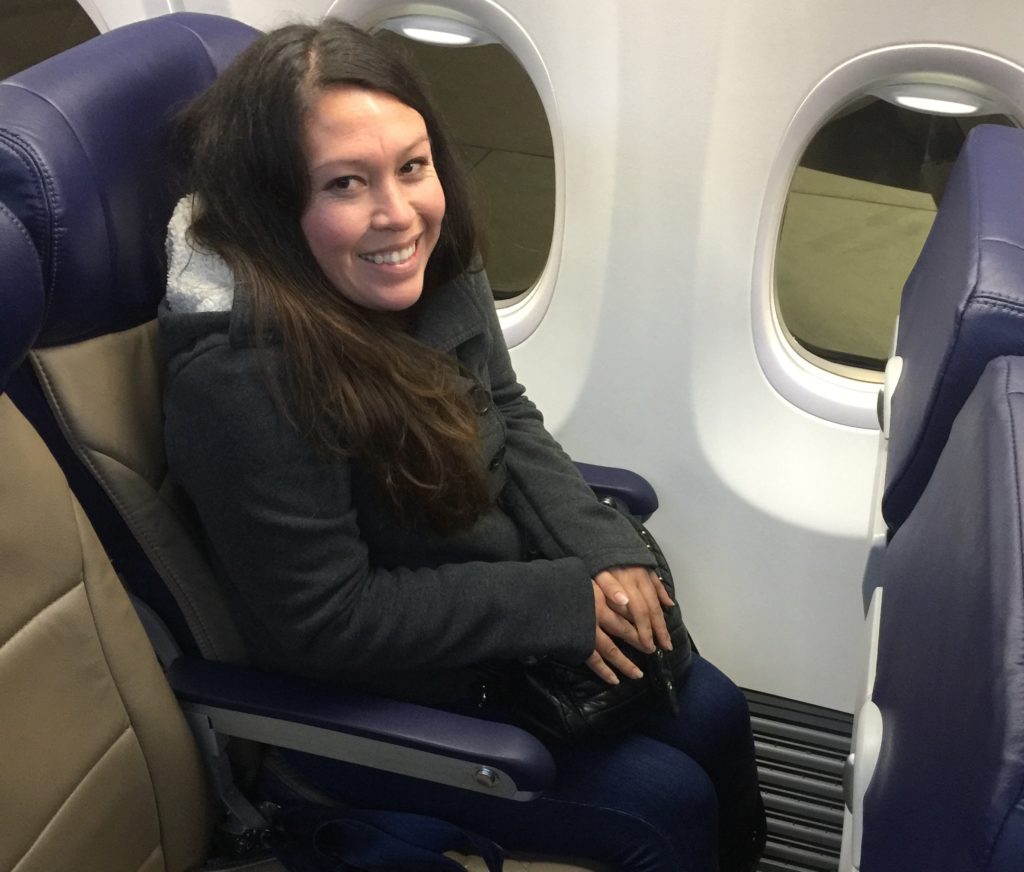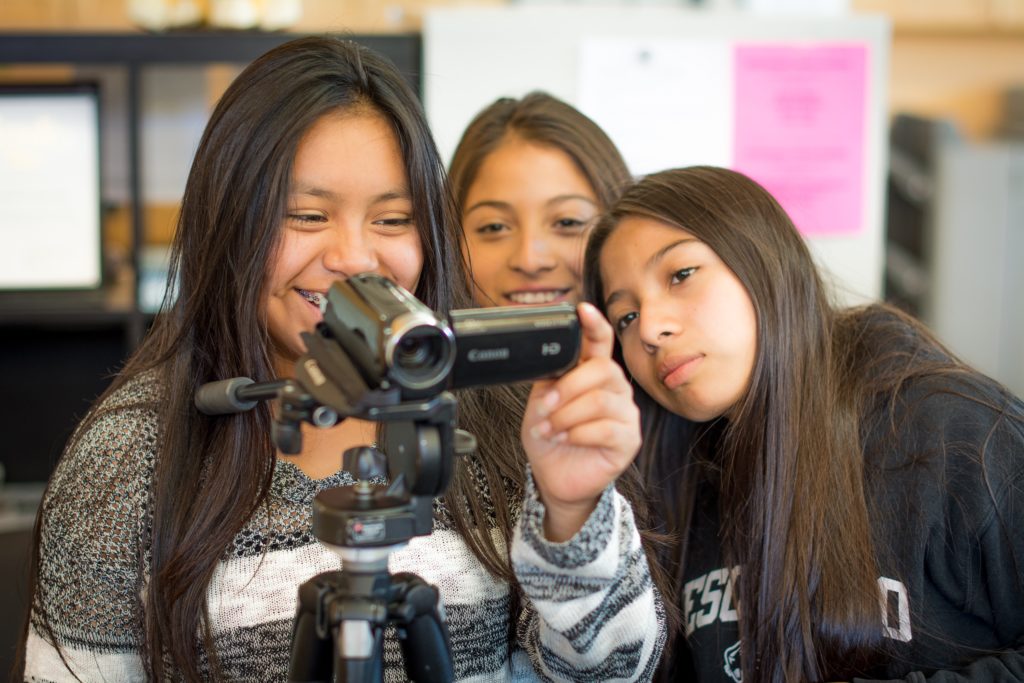 Eufemia Castro’s life has had a lot of firsts. She’s the first in her family to attend college – but not as a youth: she’s the mother of two adolescents. She and her friend Liliana were the first to graduate from Puente’s GED program, in 2014.
Eufemia Castro’s life has had a lot of firsts. She’s the first in her family to attend college – but not as a youth: she’s the mother of two adolescents. She and her friend Liliana were the first to graduate from Puente’s GED program, in 2014.
Not long after that, Castro found her calling as a future preschool teacher while taking some classes in early childhood education at Cañada College (a community college in Redwood City). It’s going to be arduous to attain the necessary certification, but Castro is used to the challenge of balancing classes and homework with working to feed her family (she works full-time cleaning hotel rooms in Pescadero).
“It’s taking time – and I still need to work 40 hours a week, and sometimes more, to help my family. What keeps me going is that one day I’m just going to get there. Hopefully in another year or two I’ll be showing off my [Early Childhood Education] certificate,” she says.
To say Castro is determined is a vast understatement. It took her three years of constant work to earn her GED. It’s even more remarkable considering she left Mexico with only an elementary school education, learned English at Puente, and raised two babies while making it all happen. She is a serious and well-spoken woman in her early 30s.
Now her life has taken on a new set of “firsts.” At the suggestion of Arlae Alston, Puente’s Family Engagement Project Manager, Castro enrolled in a program to become an accredited in-house trainer within PITC, the Program for Infant-Toddler Care. But to learn the curriculum, Castro had to accompany Alston to a five-day training conference in San Diego, which happened in January.
Which was how Alston realized that Castro had never flown on an airplane before – another first. It was all very overwhelming for Castro, who had never been through a security line or used a ticketing machine.
And as misfortune would have it, their flight to San Diego was extremely turbulent.
“It was so awful. The whole way over there I had my eyes closed. I told myself, ‘just pretend you are sleeping, and nobody is going to notice that you are nervous,’” she recalls with a laugh.
Alston and Castro stayed in the same hotel where the conference occurred – it was Castro’s first time sleeping in a hotel, as opposed to cleaning them. While they were there, she discovered the hotel hot tub, and thereafter insisted they take a dip every night.
The best part, however, was getting to know more than 100 other participants, mostly women, who were there to help promulgate the PITC philosophy of infant/toddler care. “I got the chance to meet new people there, and we all have something in common: we want to help parents and help children. We are all connected with that objective,” says Castro.
Alston was impressed, and even moved, as she watched Castro absorb a firehose of new information in unfamiliar surroundings.
“I loved seeing her mingling with people. It was so great to see her talk about her passions, why she was here, and what she wanted to do for her community,” says Alston.
The PITC philosophy focuses on a relationship-based approach to infant-toddler learning. The better the relationship an infant has with his or her caregivers, the safer the child feels. For example, if a mother is in distress or depressed and cannot respond to the baby’s needs and cues, that hurts the attachment. PITC believes that early positive relationships benefit the attachment, build health and self-esteem, and make it possible for an infant to learn.
For nearly three years, the San Mateo County Office of Education has sponsored formal PITC training sessions and in-home visits for local parents and community childcare providers – women who care for other parents’ children during the day. A PITC trainer provided the formal workshops. After that, Alston followed up with monthly in-home meetings.
The PITC tradition holds strong in Puente’s recently-opened bilingual parent co-op for toddlers aged 18 to 36 months, where teachers spend a lot of personal time interacting with children on an individual basis. Teachers also work hard to create an environment that is rich in stimulation to feed children’s imagination and curiosity – but is also safe and secure.
“Think about how you’ll sometimes enter a space and smell something that is familiar to you. The way that makes you feel – that’s how we want children and families to feel in our program,” explains Alston.
Toddlers bring their own blankets and pillows from home for naptime, and families who participate in the co-op take turns cooking for everyone.
It’s important for families to bring their own culture into the classroom, says Alston. Parents are asked to bring family photographs into the co-op and make collages with them. The colleges are laminated and used as a teaching tool, to help promote attachment in the children.
The parent co-op is on a strong growth trajectory. It recently expanded its hours from 8 a.m. to 3 p.m. every day, except Fridays, when it closes at 12 p.m.
Puente wants to further expand co-op hours from 7 a.m. to 6 p.m., which would reflect the true needs of parents who work long days in local fields and nurseries. That would involve adding a third teacher, and Alston hopes to eventually hire Eufemia Castro as that teacher.
When she finishes her PITC training later this year, Castro will be able to take Alston’s place in the community as an accredited instructor, visiting caretakers’ homes and showing them the best ways to work with, teach and discipline children under 5.
“When I was little I couldn’t get his type of education. I never got to go to preschool or kindergarten,” says Castro, who was the youngest of 8 children in a small town in Mexico. None of them got the education they wanted. Their parents focused on keeping them safe and obedient.
“I started elementary school when I was five years old and I’ve realized I missed a lot by not having preschool,” adds Castro. “With PITC, I feel like I can urge parents to help their children to take advantage – because a quality early education is really important.”
It will be a full-circle moment for Castro, who was herself a community childcare provider, taking care of other people’s kids for many years when she first arrived in Pescadero.
“I wish I had known then what I know now [about raising children]. But now I can help the people who are where I was back then,” she says.
There’s no doubt that Castro will get there. But when she does, what will she conquer next? Her answer points to another “first.”
“Who knows?” she smiles. “Maybe in the future I’ll transfer to a four-year university.”
If you were moved by Eufemia’s story as we were and would like to support Puente’s Adult Education and Early Childhood Education Programs connect with us here.
 Puente Youth Leadership Development and Employment Program Deadline is March 31.
Puente Youth Leadership Development and Employment Program Deadline is March 31.
 Eufemia Castro’s life has had a lot of firsts. She’s the first in her family to attend college – but not as a youth: she’s the mother of two adolescents. She and her friend Liliana
Eufemia Castro’s life has had a lot of firsts. She’s the first in her family to attend college – but not as a youth: she’s the mother of two adolescents. She and her friend Liliana 



